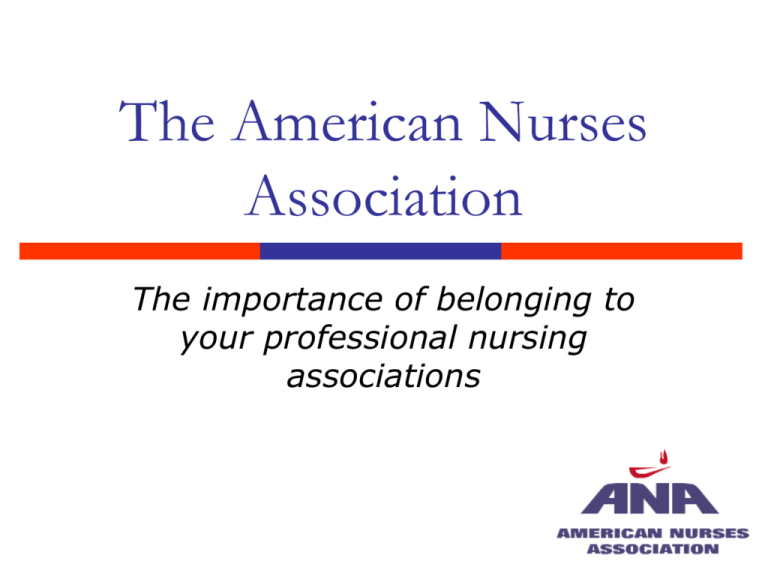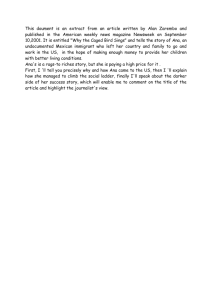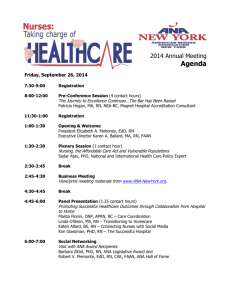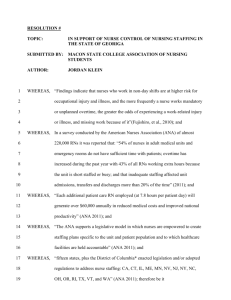Who are ANA's Members? - American Nurses Association
advertisement

The American Nurses Association The importance of belonging to your professional nursing associations What do associations do? Set the standards of practice for the profession Maintain the Code of Ethics Promote the profession to the public Educate their members on issues through continuing education and publications Advocate for their members on the Federal and State level Provide opportunities for members to interact, discuss trends and disseminate knowledge Nursing Associations There are over 100 specialty organizations Focus on the clinical aspects of each specialty Focus on areas that are unique to the specialty American Nurses Association Focus on the issues that affect all of nursing and patient care History of ANA Deplorable working conditions and the need to protect the public from incompetent women who claimed to be trained nurses propelled nursing leaders to form an association of trained nurses In September 1896, The Nurses Associated Alumnae of the United States and Canada was formed Renamed the American Nurses Association in 1911 The Goals of the Association “To establish and maintain a code of ethics; to elevate the standards of nursing education; to promote the usefulness and honor, the financial and other interests of nursing.” Minutes of the Association, February 1897 A Sample of Historical Accomplishments 1901 – Helped secure passage of a bill creating the Army Nurse Corps – under the direction of a properly trained nurse 1913 – With the Red Cross, ANA developed a plan that took public health nursing to rural communities. 1934 – ANA’s House of Delegates approved an 8-hour work day for nurses 1945 – ANA intensified efforts to recruit nurses for military service as an alternative to President Roosevelt’s proposal to draft nurses into military services. 1955 – ANA helped pass a bill to commission male nurses in the Reserve Nurse Corp A Sample of Historical Accomplishments 1965 – ANA was the first association of health care professionals to endorse the creation of Medicare. 1976 – Nurse Training and Health Services Bill, vetoed by President Ford, was overridden by Congress, recognizing the existing and expanding role for nurses in delivering health care. 1986 – Helped to create the National Institute for Nursing Research at NIH. 1998 – ANA supported the “Patient Right to Know Act” with provisions for anti-discriminatory language, coverage of emergency care and prohibitions of gag clauses in managed care plans. ANA Today ANA Goals Today 1. Professional Practice and Excellence – ANA successfully champions professional nursing excellence through standards, code of ethics and professional development, such as credentialing and lifelong learning. 2. Healthcare and Public Policy – ANA is an acknowledged leader in the formulation of effective healthcare and public policy as they affect the profession and the public. 3. Knowledge and Research – ANA is the recognized source for accurate, comprehensive health policy information based on knowledge from research. 4. Unification – ANA facilitates unification and advancement of the profession. 5. Workforce and Workplace Advocacy – ANA with its partners and through its organizational relationships is the leader in promoting improved work environments and the value of nurses as professionals, essential providers and decision makers in all practice settings. ANA’s Foundational Work Code of Ethics for Nurses A statement of the ethical obligations and duties of every individual who enters the nursing profession The profession’s nonnegotiable ethical standard An expression of nursing’s own understanding of its commitment to society ANA’s Foundational Work Nursing Scope and Standards 23 current standards Produced in cooperation with the Specialty Nurses Organizations Nursing’s Social Policy Statement Reflects a new definition of nursing ANA Working for Nurses on Capitol Hill Nurse Reinvestment Act Provides federal funding for scholarships and training Funded for $150 million in 2006 – a 120% increase from 2000 funding levels of ~$68 million. Smallpox Emergency Personnel Protection Act of 2003 Assures the proper administration of vaccinations Compensates individuals injured by the vaccine ANA Protecting Nurses – Needlestick & Sharps Injury Prevention ANA successfully pushed for enactment of OSHA Bloodborne Pathogen Standard, Needlestick Safety and Prevention Act of 2000, and multiple state needlestick legislation Estimates show declining rates of needlestick and sharps injuries, though injuries continue to occur. Our work is not done! Train-the-trainer program teaches implementation of a needlestick prevention committee and compliance with OSHA regulations ANA Needlestick Prevention Guide available free on Nursingworld.org website ANA Protecting Nurses – Back Injury Prevention/Safe Patient Handling ANA Board approves position statement titled “Elimination of Manual Patient Handling to Prevent Work-Related Musculoskeletal Disorders” in June 2003 Co-sponsorship of annual Safe Patient Handling Conferences in coordination with the Tampa VA Patient Safety Center Educational campaign targeting front-line nurses, healthcare administrators, and nursing schools Ergonomics identified as a priority for ANA nationwide state legislative agenda ANA Protecting Patients Recognizing the aging population, ANA’s Nurse Competence in Aging program works to increase nurse’s capacity to care for aging patients Cover the Uninsured Week, May 17, 2006 ANA is the only nursing organization among 18 national partners Take Action for Healthy Blood Pressure Campaign Free blood pressure screenings and consumer education in 10 cities in partnership with state nurses’ associations in 2005 ANA Promoting Nursing Coverage for the work of ANA and Nursing in prominent magazines, newspapers, radio and television Nurses have topped Gallup’s professional honesty and ethics poll every year but one since 1999 when nurses were first added to the poll In 2001, Firemen were rated number one ANA Proving the Value of Nurses ANA’s National Database for Nursing Quality Indicators (NDNQI) helps to demonstrate the positive impact of the appropriate mix of nursing staff on patient outcomes Provides data at the unit level Develops a database to inform practice and policy ANA, along other nursing organizations, has funded research to help quantify the economic value of nursing ANA Representing Nurses ANA represents nursing at numerous tables (and is often the only nurse in the room!) Institute for Healthcare Improvement Saving 100,000 Lives Campaign; National Quality Forum; U.S. Department of Health and Human Services; Agency for Healthcare Research and Quality; Centers for Disease Control and Prevention; Centers for Medicare and Medicaid Services; National Institutes of Health; National Institute for Occupational Safety and Health; U.S. Department of Labor; American Hospital Association; American Health Care Association – Long Term Care Commission; American Medical Association; American Medical Informatics Association; American Public Health Association, American Society of Bioethics and Humanities; e-Health Initiative; Families USA; Hospitals for a Healthy Environment; International Council of Nursing; Institute for Healthcare Improvement; Institute of Medicine; Joint Commission of Accreditation of Health Care Organizations; National Association for Home Care; National Coordinating Council for Medication Error Prevention and Reporting; National Coalition of Health Professional Education in Genetics; National Council of Patient Information & Education; National Conference of State Legislators …Just to name a few! ANA Subsidiaries The American Nurses Credentialing Center’s many programs include certification for all levels of nursing and MagnetR Hospital Recognition Program The American Nurses Foundation has awarded over 900 nursing research grants since 1955 with over $3 million dollars granted. The AAN is comprised of 1,500+ qualified and savvy nurse leaders who are literally at the top of their profession. AAN members have been identified by their peers to be the best and the brightest in the nursing discipline. ANA Organizational Members Constituent Member Associations ANA has a state nurses association in every state plus the District of Columbia, Guam, the Virgin Islands, and a uniformed nurses constituency Organizational Affiliates Currently 21 of the top specialty nursing organizations belong to ANA State Nurses Association Key in protecting the Nurse Practice Acts in each state Instrumental in advancing the rights of advanced practice nurses in each state The voice for nurses at the state legislature ANA and the state nurses associations work to coordinate this effort to be more effective All this work is already being done – why do I need to belong? Belonging is Important! More nurses belonging to nursing associations…. Gives additional power to the association when speaking in front of Congress and other regulatory bodies Gives additional funds for associations to do work on behalf of the profession Puts nursing in a position to direct health care policy versus reacting to it Plus Membership Gives you A voice in the decisions being made for the profession The opportunity to receive discounts and benefits as a member Discounts on certification Free continuing education Access to members only information A chance to interact with nurses around the country How do I belong A variety of ways to belong when you are a RN Through your state nurses association – most states offer discounted dues for new nurses In some states, directly to ANA or your CMA As a student, you may become a subscriber to Members Only on Nursingworld.org Become involved now by participating in your local National Student Nurses Association chapter ANA and Nursing are excited to have you join the profession – We hope you will join ANA and your specialty nursing association For more information go to: NursingWorld.org The official web site of the American Nurses Association






